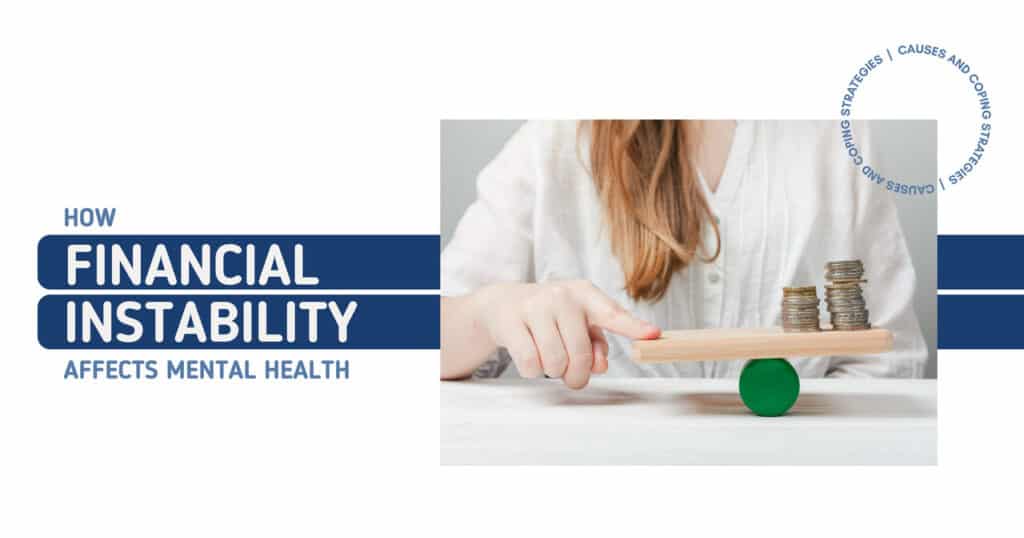From panic attacks and sleep disturbances to headaches and high blood pressure – financial anxiety can lead to a variety of issues with your physical and mental wellness. A person unable to pay for the essentials is understandably less concentrated on their personal and professional life – it is easy to feel consumed by your thoughts and feelings when financial instability takes over your life. Everyone is struggling with money in one way or another, and the economic crisis your country and the entire world may face is not something you can control on your own.
In our guid, we will focus on the link between financial instability and mental health, explain how to identify whether you are struggling mentally with your financial standing, and elaborate on the ways of coping with financial anxiety.
How Financial Instability Impacts Mental Health
Whether you owe money to someone, struggle to pay for groceries once in a while, or receive a past due invoice letter when a bill or two are unpaid, this may or may not cause you grief. However, most people feel extreme sadness and hopelessness when they are unable to manage their expenses or a letter from a bank or creditor reminds them how dire their financial situation is.
Studies have shown that individuals of all ages worry about money – teenagers often lack finances to pay for activities they want to share with their friends, adults constantly think about their own expenses and the spending habits of their families, and elderly people are concerned about their retirement and possible lack of funds that may occur when they no longer work.
The financial status of an individual also does not play a significant role when it comes to financial instability – you would be surprised how many people you consider rich wake up late at night thinking about finances, investments, and missed business opportunities.
San Jose Mental Health
Signs of Mental Health Struggles Due to Financial Stress
Money worries are on top of the list of things that cause mental anguish and lead to mental health disorders. Here are just a few manifestations of the negative impact of finances on mental health:
| Signs of Financial Stress | Description |
Anxiety |
Cannot sleep at night because you do not know how you will pay your bills? Or maybe you cannot focus on your duties thinking over and over again about financial burdens you cannot bear? Nervousness reveals itself differently but you and people around you may notice how worried and empty you feel and sound |
Loneliness |
Individuals who have struggled with finances at some point in their lives can relate to the feeling of isolation such a burden causes – you cannot go out with your friends or afford an expensive item or trip others can pay for which makes you feel isolated. Additionally, people withdraw into themselves not letting others find out how difficult their lives are due to money troubles |
Guilt |
You may feel ashamed because you do not have money and cannot support your own needs as well as take care of your loved ones the way they deserve; there is also another issue – you may experience guilt after spending money on something you do not need or treating yourself even if the purchase did not harm your financial situation |
Anger |
Unfortunately, getting angry because you lack financial stability is a common symptom of financial stress – you can lash out at your partner, kids, or coworkers when you are reminded you do not have sufficient funds even if it was not the intention of the person to insult you or ruin your mood |
The Vicious Cycle: Financial Instability and Mental Health
Financial stress and mental health are interconnected – while a grave financial situation can make you nervous and agitated at the very least, any kind of mental disorder inevitably brings chaos to your life making you less productive and less likely to earn enough money to support yourself and your family. In some cases, it is possible to cope with a personal issue or rely on others when you experience a life-changing event but the lack of money can result in severe consequences such as inability to pay rent, afford medical treatment, or cover educational expenses.
Individuals without emergency funds or wealthy relatives and friends to support them financially have to take multiple loans getting into debt and paying interest for years ruining their credit. More and more people are forced to go through major life transitions basing their decisions on their finances – whether you are divorcing, quitting your job, or moving to another town, it is frequently accompanied by financial anxiety. This is why adequate planning is a key factor to ensure you are safe both financially and psychologically.
San Jose Mental Health
Coping Strategies for Managing Financial Stress
Remember: you are not the only person in the world struggling with your finances and thankfully, there are ways to relieve the pressure you put on your mind while overthinking your financial future. Here is how you can tackle financial stress and feel you are in control of your money as well as your mental well-being:
| Strategy | Description |
Be Proactive With Your Finances |
Creating a budget, saving a specific portion of your earnings, monitoring your credit, and tracking expenses – these are the most common practices to use when your goal is to be the master of your finances. It is paramount to set financial goals and do everything in your power to accomplish them – remain realistic and flexible when you are earning or spending |
Stick to Your Plans |
This is general advice you should apply in all aspects of your life to ensure your financial position does not deteriorate. Whether your aspiration is to save a large part of your salary, follow a precise sleep routine, or avoid social gatherings that make you spend money without a second thought, long-term consistency will play the most important role in regaining financial security |
Prioritize Long-Term Solutions |
Sometimes, it is tempting to take yet another loan or spend your money on an investment scheme that promises quick earnings. But risks may not be the right move for you if you already have financial hardship – try to look for more stability instead of jeopardizing yourself further. Good financial habits will take you far – it is a great relief when you can depend on your savings in the event of a rainy day |
Discuss Your Problems With a Therapist |
It may be challenging to approach a financial talk with someone who depends on you financially which is why the majority of people prefer to stay quiet and accumulate financial anxiety. Instead, consider reaching out to a mental health professional equipped with knowledge on how to help you out |
Seeking Help: Financial and Mental Health Resources
It is a good idea to invest in your mental and financial health at the same time – after talking money with a financial advisor and making the first step towards proper money management, you should book an appointment with a therapist if possible to address other concerns you may have.
If you cannot afford therapy at the moment, at the very least, we suggest you open up to a person who will not judge you for making certain mistakes in your financial planning – speaking up about your financial struggles does not make you weak, and advice you might receive from an individual who cares about your present and future can give you a much-needed second opinion on how to resolve your problems more efficiently.
San Jose Mental Health
FAQs
- Is there a correlation between financial instability and mental health issues?
It is well-known that one of the main reasons to feel anxious and worried nowadays is the lack of financial security. Whether you cannot pay your bills today or you are not sure you can send your kids to college, financial stress can have a huge impact on your mental wellness even if you do not realize it at first.
- What causes financial instability?
Every case of financial instability is unique – some people made wrong financial choices, others invested in a product that failed to bring them the wealth they expected, and others went through life-changing events spending their savings.
- What are the symptoms of financial stress?
The signs of financial stress vary from one person to another but most people exhibit anxiety, feel uneasy and empty when facing the obstacles in their way, fail to sleep properly at night, and stop taking care of their physical and mental health the way they used to prior to their financial struggles.
- How do I handle financial stress?
Become more organized – think about possible solutions to your issues. Make positive changes to your daily routine to avoid repetitiveness and get inspired to find new sources of money. And most importantly, do not overwork yourself while pursuing financial gain – your exhaustion and numbness will not bring you success in the long run.
- Do I need extra help to deal with my financial instability?
While you reach out for personal financial advice and talk to financial planners, lawyers, tax specialists, and investment advisors, make an investment in your mental health as well – do not neglect the necessity to look after your mind when you are constantly stressed about money.








